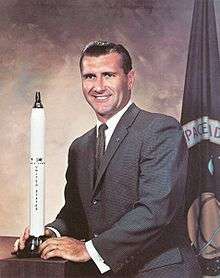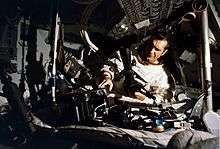Richard F. Gordon Jr.
| Richard F. Gordon Jr. | |
|---|---|
 | |
| NASA Astronaut | |
| Nationality | American |
| Status | Retired |
| Born |
October 5, 1929 Seattle, Washington, U.S. |
Other names | Richard Francis Gordon Jr. |
Other occupation | Naval aviator, test pilot |
|
University of Washington, B.S. 1951 NPS | |
| Rank | Captain, USN |
Time in space | 13d 03h 53m |
| Selection | 1963 NASA Group 3 |
Total EVAs | 2 |
Total EVA time | 2 hours 41 minutes |
| Missions | Gemini 11, Apollo 12 |
Mission insignia |
|
| Retirement | January 1, 1972 |
| Awards |
|
Richard Francis "Dick" Gordon Jr. (born October 5, 1929), (Capt, USN, Ret.), is a former American naval officer and aviator, chemist, test pilot, and NASA astronaut. He is one of only 24 people to have flown to the Moon, as the Command Module Pilot for the Apollo 12 mission.
Biography
Early life and education
Gordon was born on October 5, 1929, in Seattle, Washington. He graduated from North Kitsap High School in Poulsbo, Washington in 1947, then received a Bachelor of Science degree in Chemistry from the University of Washington in 1951.
Gordon was a Boy Scout. He earned the rank of Star Scout.[1]
He was awarded an Honorary Doctorate of Science from Niagara University in 1972.
Military and flight experience
He received his wings as a Naval Aviator in 1953. He then attended All-Weather Flight School and jet transitional training, and was subsequently assigned to an all-weather fighter squadron at NAS Jacksonville, Florida.
In 1957, he attended the U.S. Naval Test Pilot School at Naval Air Station Patuxent River, Maryland, and served as a flight test pilot until 1960. During this tour of duty, he did flight test work on the F-8U Crusader, F-11F Tiger, FJ Fury, and A-4D Skyhawk, and was the first project test pilot for the F4H-1 Phantom II. He served with Fighter Squadron 121 (VF-121) at the Naval Air Station Miramar, California, as a flight instructor in the F4H-1 and participated in the introduction of that aircraft to the Atlantic and Pacific Fleets. He was also flight safety officer, assistant operations officer, and ground training officer for Fighter Squadron 96 (VF-96) at Miramar.
He won the Bendix Trophy Race from Los Angeles to New York City in May 1961, in which he established a new speed record of 869.74 miles per hour and a transcontinental speed record of 2 hours and 47 minutes.
He was also a student at the U.S. Naval Postgraduate School at Monterey, California.
He has logged more than 4,500 hours flying time—3,500 hours in jet aircraft.
NASA career

Gordon was one of the third group of astronauts, named by NASA in October 1963. He had been a finalist for the second selection, in 1962.[2]
Project Gemini
Gordon served as backup Pilot for the Gemini 8 flight. In September 1966, he made his first space flight, as Pilot of Gemini 11, alongside Pete Conrad. Gordon was already good friends with Conrad, who had been his roommate on the carrier USS Ranger. On the flight, Gordon performed two EVAs, which included attaching a tether to the Agena and retrieving a nuclear emulsion experiment package.[3]
Apollo program

Gordon was subsequently assigned as backup Command Module Pilot for Apollo 9. In November 1969, he flew as Command Module Pilot of Apollo 12, the second manned mission to land on the Moon. While his crewmates, Pete Conrad and Alan Bean, landed in the Ocean of Storms, Gordon remained in lunar orbit aboard the Command Module, Yankee Clipper, making desired mapping photographs of tentative landing sites for future missions.[3]
After Apollo 12, Gordon was assigned as backup Commander of Apollo 15. He was slated to walk on the Moon as Commander of Apollo 18, but that mission was cancelled because of budget cuts.
Gordon completed two space flights, logging a total of 315 hours and 53 minutes in space, of which 2 hours and 41 minutes were spent in EVA.[3]
Gordon retired from NASA and the U.S. Navy in January 1972.
Post-NASA career
Since leaving NASA, Gordon has served as Executive Vice President of the New Orleans Saints Professional Football Club in the National Football League (1972–76); was General Manager of Energy Developers, Limited (EDL), a Texas Partnership involved in a joint venture with Rocket Research Corporation for the development of a liquid chemical explosive for use in the oil and gas industry (1977); President of Resolution Engineering and Development Company (REDCO) which provided design and operational requirements for wild oil well control and fire fighting equipment onboard large semi-submersible utility vessels (1978); following REDCO merger with Amarco Resources, Gordon assumed the additional duties of Vice President of Marketing, Westdale, an oil well servicing subsidiary of AMARCO operating in North Central Texas and Oklahoma, and also served as Vice President for Operations, Texas Division (1980); served as Director, Scott Science and Technology, Inc., Los Angeles Division (1981–1983).
In March 1982 he became President of Astro Sciences Corporation. This company provides a range of services including engineering, project management, project field support teams, to software and hardware system design for control room applications. In the summer of 1984, Gordon was a Technical Advisor for and played the part of "Capcom" in the CBS miniseries Space by James A. Michener.
Gordon has served as Chairman and co-Chairman of the Louisiana Heart Fund, Chairman of the March of Dimes (Mother's March), Honorary Chairman for Muscular Dystrophy, and Board of Directors for the Boy Scouts of America and Boys' Club of Greater New Orleans.
Personal life
Gordon has married twice, with six children: Carleen (born July 8, 1954), Richard (born October 6, 1955), Lawrence (born December 18, 1957), Thomas (born March 25, 1959), James (born April 26, 1960; deceased) and Diane (born April 23, 1961). He has two stepchildren, Traci (born May 30, 1966) and Christopher (born May 10, 1970) with his wife Linda. His hobbies include water skiing and golf.[4]
Organizations
He is a fellow of the American Astronautical Society, an associate fellow of Society of Experimental Test Pilots and a member of the Navy League.
Awards and honors
- Navy Astronaut Wings
- NASA Distinguished Service Medal
- NASA Exceptional Service Medal
- Bendix Trophy in 1961
- Two Navy Distinguished Flying Crosses
- Navy Distinguished Service Medal
- Phi Sigma Kappa Merit Award in 1966
- Institute of Navigation Award for 1969
- Godfrey L. Cabot Award in 1970
- Rear Admiral William S. Parsons Award for Scientific and Technical Progress in 1970
- MSC Superior Achievement Award
- NASA Group Achievement Award
- Gordon Elementary School [5] in Kingston, Washington was named after him.
- Inducted into the International Space Hall of Fame, 1982
- Gordon was inducted into the U.S. Astronaut Hall of Fame on March 19, 1993.
In media
In the 1998 HBO miniseries From the Earth to the Moon Gordon was played by Tom Verica.
Books authored
Gordon wrote the foreword of the book Falling to Earth: An Apollo 15 Astronaut's Journey to the Moon by fellow Apollo astronaut Al Worden,[6] as well as the foreword to Footprints in the Dust.[7]
Technical papers

- Gordon, R. F., F4H-1 Navy Preliminary Evaluation, Phase I, NAS Patuxent River, Maryland, September 1958.
- Gordon, R. F., F4H-1 Navy Preliminary Evaluation, Phase I Supplement, October 1958.
- Gordon, R. F., FJ-4B Fuel Consumption and Performance Report, Flight Test, NAS Patuxent River, Maryland, 1958.
- Gordon, R. F., F11F Fuel Consumption and Performance Report, Flight Test, NAS Patuxent River, Maryland, 1958.
- Gordon, R. F., Revised Roll Performance Requirements for MIL-SPEC-F-8785. All Aircraft in Configuration PA, Flight Test, NAS Patuxent River, Maryland, 1958.
- Gordon, R. F., F8U Spin Evaluation Report, Flight Test, NAS Patuxent River, Maryland, 1959.
- Gordon, R. F., Gemini XI, Gemini Program Mission Report, NASA Manned Spacecraft Center Report, October 1966.
- Gordon, R. F., Apollo XII Mission Report, NASA Manned Spacecraft Center Report, December 1969.
References
- ↑ "Scouting and Space Exploration". Archived from the original on March 4, 2016.
- ↑ Chaikin, Andrew. 24th man on the Moon. Penguin Books Ltd. ISBN 978-0-14-024146-4.
- 1 2 3 "Biographical Data: Richard F. Gordon Jr.". NASA. Retrieved September 4, 2012.
- ↑ "Astronaut Bio: Richard F. Gordon".
- ↑ Archived February 10, 2006, at the Wayback Machine.
- ↑ Falling to Earth web site
- ↑ "Footprints in the Dust - University of Nebraska Press".
External links
| Wikimedia Commons has media related to Richard F. Gordon Jr.. |
- Official website of Dick Gordon
- Gordon's official NASA biography
- Astronautix biography of Richard F. Gordon Jr.
- Spacefacts biography of Richard F. Gordon Jr.
- About Richard F. Gordon Jr.
- Richard F. Gordon Jr. at the Internet Movie Database
- Gordon at Encyclopedia of Science
- Gordon at Spaceacts
- Gordon at International Space Hall of Fame
- Episode 43 on astrotalkuk.org Interview during visit to the UK April 2011
